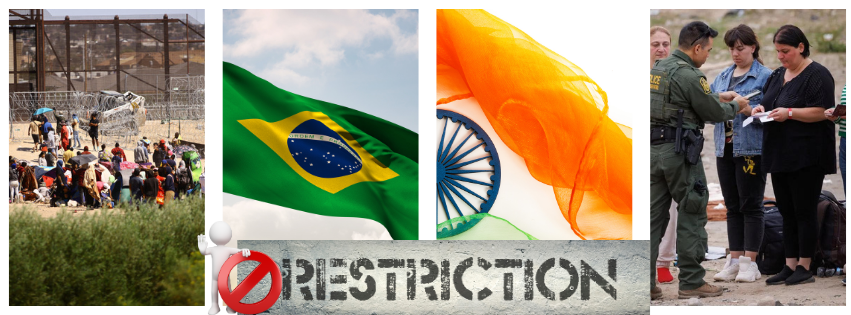Brazil's Strict Entry Rules for Asian Migrants: Impact on Indian and Other Communities
Discover how Brazil's new immigration policies are impacting Asian migrants, particularly Indian nationals. Explore the reasons behind the strict entry rules and their implications for those seeking a new life in Brazil


Brazil Tightens Entry Rules for Asian Migrants: A Closer Look at the Impact on Indian Nationals and Others
Brazil, known for its diverse cultural fabric and welcoming attitude, is now taking a more stringent approach to immigration, particularly targeting Asian migrants. The new entry rules, which have raised eyebrows and stirred debate, primarily focus on Indian nationals, among others. This policy shift signals a significant change in Brazil's immigration stance, affecting those who once viewed the country as a land of opportunity.
Why the Shift in Immigration Policy?
The Brazilian government has cited various reasons for these stricter regulations. The primary concern is the management of illegal immigration and human trafficking, which has seen a surge in recent years. Brazil's borders have been a point of entry for migrants seeking better opportunities, but this has also led to challenges in maintaining security and order. The focus on Asian migrants, particularly those from India, is partly due to the increasing number of undocumented individuals entering the country under the radar.
Impact on Indian Nationals
Indian nationals have been among the most affected by these new rules. Many Indians have been drawn to Brazil by the promise of economic opportunities and a welcoming environment. However, the recent changes have made it more difficult for them to enter and settle in Brazil. Stricter visa requirements, thorough background checks, and increased scrutiny at entry points are now the norm. For those already in Brazil, the path to regularizing their status has become more complicated, with potential deportations and limited access to legal avenues.
Broader Implications for Asian Migrants
Beyond India, migrants from other Asian countries such as Bangladesh, Pakistan, and Nepal are also facing the brunt of these policies. The ripple effect is felt across the community, with many potential migrants reconsidering their plans to move to Brazil. For those in the country, the atmosphere has become tense, with fears of being targeted or unfairly treated based on their nationality.
Criticism and Response
The strict entry rules have not gone without criticism. Human rights organizations and migrant advocacy groups have raised concerns about the potential for discrimination and the harsh impact on individuals who are simply seeking better lives. The Brazilian government, however, maintains that these measures are necessary to protect national security and maintain social order.
In response, some communities have started organizing to provide support to those affected. Legal assistance, community support groups, and awareness campaigns are being mobilized to help migrants navigate the new landscape. However, the road ahead remains uncertain for many.
Conclusion
Brazil’s decision to enforce stricter entry rules for Asian migrants, with a significant focus on Indian nationals, marks a pivotal moment in its immigration policy. While the government’s intent is to curb illegal activities and maintain security, the human cost is evident. As Brazil continues to balance its need for security with its tradition of openness, the world watches closely to see how this situation unfolds.
For migrants from India and other Asian countries, the dream of a new life in Brazil has become more challenging, requiring resilience and support from both the community and international organizations.
